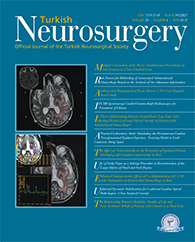2Gazi University, Faculty of Medicine, Departments of Medical Biochemistry , Ankara, Turkey
3Gazi University, Faculty of Medicine, Departments of Pathology, Ankara, Turkey DOI : 10.5137/1019-5149.JTN.5966-12.1 AIM: Failed back surgery syndrome is observed in 15% of patients who have undergone surgery for lumbar disk hernia.Excess epidural fibrosis is the etiology in 24% of FBSS cases. This study was conducted with the belief that the antiproliferative effect of temozolomide can prevent epidural fibrosis.
MATERIAL and METHODS: 8 rats (Group I) underwent laminectomy and were then administered saline while 6 rats (Group II) were administered temozolomide at a dose of 18 mg/kg/day for 5 days after the surgery to make up a total of 14 male Wistar rats used. The pathology preparations of subjects sacrificed at the end of week 6 were histopathologically examined with the Hematoxylin-Eosin stain and Trichrome stain. The pathology preparations were assessed with the analysis parameters and scale generated by He et al. The results were analyzed with the Chisquare test.
RESULTS: No significant difference was found between the two groups in terms of bone and cartilage regeneration, arachnoidal fibrosis, and inflammatory and fibroblast cell densities. Epidural fibrosis formation was significantly less and there was no grade III fibrosis in the Temozolomide group. This was found to be statistically significant (p=0.0302). No side effect of dural or intradural damage was observed.
CONCLUSION: Temozolomide was found to be effective in preventing epidural fibrosis. However, further research is required to determine its effectiveness in local applications and the appropriate dose range.
Keywords : Temozolomide, Epidural fibrosis, Anti-proliferative drug, Laminectomy, Failed back surgery syndrome




